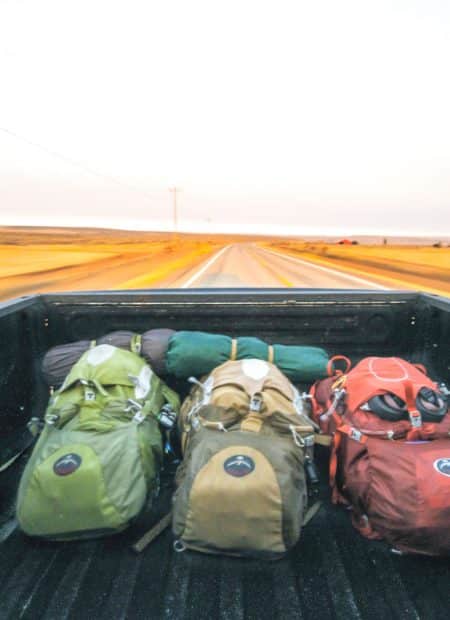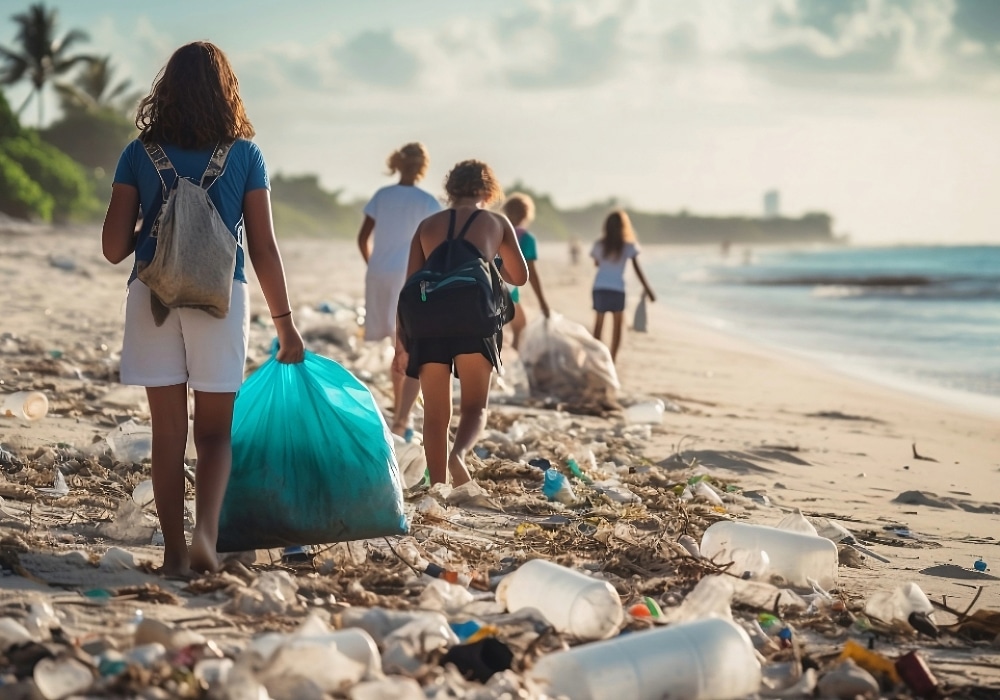
When Helping Hurts: 13 Scary Problems with Voluntourism
Travelling and discovering the world isn’t enough anymore. Young people are becoming increasingly aware of the issues of the world and many using their trip to help local communities. But with a limited set of skills and little time, it’s hard to make a difference. Read on to discover 13 scary problems with voluntourism!
WHAT IS 'VOLUNTOURISM'?
“Voluntourism” is the merging of volunteering and tourism. It’s a growing trend of altruistic travel, particularly among gap-year students from western countries.
Travellers choose to do voluntary work, sometimes in exchange for bed and board, while travelling and exploring a new and exciting destination. There are countless opportunities to volunteer abroad. Travellers can build toilets in Uganda, plant trees in Costa Rica, conserve species in Peru or teach English in Nepal.
Young, gap-year travellers particularly are drawn into this voluntary work. Volunteering provides valuable experience. Imagine applying for university or a job and being able to show on your CV that you didn’t just travel, you worked hard too!
Helping those in need whilst enhancing your CV sounds harmless, right? But if we’re not careful, volunteering abroad – ‘voluntourism’ – can do more harm than good.

13 SCARY PROBLEMS WITH VOLUNTOURISM
#1 VOLUNTEERS DON'T HAVE THE RIGHT SKILLS
It used to be that most people who volunteered abroad did so in a position that they’d trained for. For example, doctors taking time out to volunteer with Medicines Sans Frontiers, or teachers moving abroad to teach English.
But now, one of the problems with voluntourism is that volunteers are unskilled. Most volunteers are young gap-year travellers looking for a meaningful experience and a CV boost. These types of tourists simply don’t have the skills needed for projects, whether that’s building toilets, teaching children, or helping in a hospital.
And with volunteer programs usually lasting just a week or two, there is no expectation for them to stay in one location for long enough to be trained properly.
This can be particularly problematic in construction-based projects, such as building houses or toilets. Most volunteers have little to no background in construction and may produce poor quality or unstable work, potentially causing more harm than good. This makes more work for the local community, who have to invest their own time, money and energy to fix things that should have been done professionally in the first place.
#2 VOLUNTOURISM HINDERS ACTUAL PROGRESS
Another one of the problems with voluntourism is that it can hinder progress for the community you’re volunteering in. Volunteer programs are expensive! Even if they offer a longer volunteering experience, most volunteers can only afford to join these programs for as little as one to two weeks.
This is barely enough time to train a volunteer, let alone for them to make real progress or to see tangible results. Such projects may provide temporary relief but will not contribute to sustainable, long-term solutions for a community.
Vulnerable communities need consistent support and development efforts to see lasting progress. Yes, there’s little harm in using volunteers to prop up a community project whilst these necessary skills are being taught. But the ultimate end goal for a community should always be self-sufficiency. We shouldn’t be creating a dependency on overseas aid.
#3 VOLUNTOURISM DISRUPTS THE LOCAL ECONOMY
So, we’ve seen that two of the problems with voluntourism are that unskilled volunteers arrive and create more problems. Well, when these volunteers flood a community, they take jobs that could be done by local people. Why would organisations pay for local labour when volunteer tourists are willing to (a) work for free and (b) pay for the privilege of doing so?
This is unsustainable in the long run. Volunteers prevent locals from learning or being taught the necessary skills that could then be used to sustain the community. And voluntourism organisations aren’t about to change this, because to do that would see them lose profits.
The traveller benefits. The company benefits. But the local people don’t? That doesn’t seem fair.
#4 VOLUNTOURISM INCREASES DEPENDENCY
Relying heavily on volunteers, especially for critical services, can make a community dependent on outside companies or countries. When people in a community aren’t being taught the necessary skills, it’s very easy for them to become reliant on the volunteers and volunteer programmes. This leaves communities forever reliant on external help – a huge problem with voluntourism!
Helping people is commendable but where possible, it’s better to help others help themselves. Voluntourism projects shouldn’t create a long-term dependency on volunteers; they shouldn’t start and end with you.
The money, time and efforts of volunteers could be better invested in sustainable projects. For example, making local communities more economically independent and self-sufficient or leading training workshops to boost employment. Sustainable development empowers local communities to take charge of their own progress rather than perpetuating a cycle of dependence.
#5 THE FEES YOU PAY TO VOLUNTEER MIGHT NOT ACTUALLY GO TO THE COMMUNITY
Another one of the problems with voluntourism is that volunteers don’t often know where their financial contributions are going.
Volunteers will often offer their services without expecting payment. Some voluntourism projects are even funded by travellers who will pay thousands of pounds, dollars, or euros to ‘help’ on a project that ‘looks good on their CV’. Other projects don’t require a hefty payment but you’ll be expected to pay for your own bed and board whilst you work for free.
Do you know how much of the money you pay actually ends up in benefiting the host community? Is the company transparent about where the money you are paying will go? Often, volunteers have no idea where their program fee is going.
It’s not wrong for the organisation arranging your voluntary experience to expect to make a profit. But most of the money you pay should be going into the community or project. Disappointingly, this is often not the case, as most of the placement fees usually go straight into the pocket of the organisation instead.

#6 VOLUNTOURISM MAY EXPLOIT LOCAL COMMUNITIES…
We get it, you want to do good. But the issues with voluntourism aren’t usually with you, the volunteer. The issues are with the organisation running your volunteering program.
The funds spent on organising and facilitating voluntourism projects are not usually efficiently allocated. A significant portion of the budget is likely to go towards travel, accommodation, and into the pocket of the organisation arranging your placement instead of directly benefitting the community.
The community you are trying to help may simply be used as the stage for your project, allowing the organisation behind it to cash out!
#7… WHILST NOT PRIORITISING EMPLOYMENT OPPORTUNITIES AND TRAINING LOCAL STAFF
Large organisations may also choose not to employ local staff. Volunteer tourism companies have the potential to provide employment opportunities for locals. They could hire local people and train them in necessary skills, English language, web design, SEO, all things a company needs to attract travellers and their tourist dollars.
However, most organisations do not prioritise employment and training for local people in the community. Instead they favour the employment of Westerners, or rely solely on volunteers to carry out their mission.
#8 VOLUNTOURISM DRAINS LOCAL RESOURCES
Communities receiving volunteers want to be great hosts and give the best impression of their country. Often, they pour money and resources into giving volunteers the best food and accommodations. Sending plane-loads of young people who are unskilled and unqualified is putting a burden on communities. They could, instead, invest this money into improving their own lives.
#9 VOLUNTEERING ORGANISATIONS PRIORITISE FOREIGN INTEREST OVER LOCAL COMMUNITIES
Organisations running voluntourism programs are often owned by foreign companies, based in western locations like Europe, the USA, or Australia. These companies are managed overseas, separate from the community that you go to volunteer in.
This means that profits and personal gain are their priorities! All that money that you’re paying to volunteer? Well, most of it is going to the organisation. Unfortunately, not a lot of this will end up benefitting the host community.
#10 VOLUNTEERS DON’T HAVE BACKGROUND CHECKS OR QUALIFICATIONS
In your home country, there are likely regulations and policies that are required of workers and volunteers. Usually, you need a teaching qualification to teach children, and you need a background check to work with children. If you are not a trained builder you cannot build houses. And if you want to build toilets, you’ll need some kind of plumbing qualification.
Could you walk into a school or children’s home in your home country without a background check and start teaching or organising games for the children there? What about building a toilet or school with no former construction training, or working in a hospital without a medical background? We didn’t think so! Nor would you be allowed to walk into a hospital and start assisting doctors or cleaning up.
So why is it alright to do these things in a foreign country?
We don’t recommend volunteering with children as it most often does more harm than good.
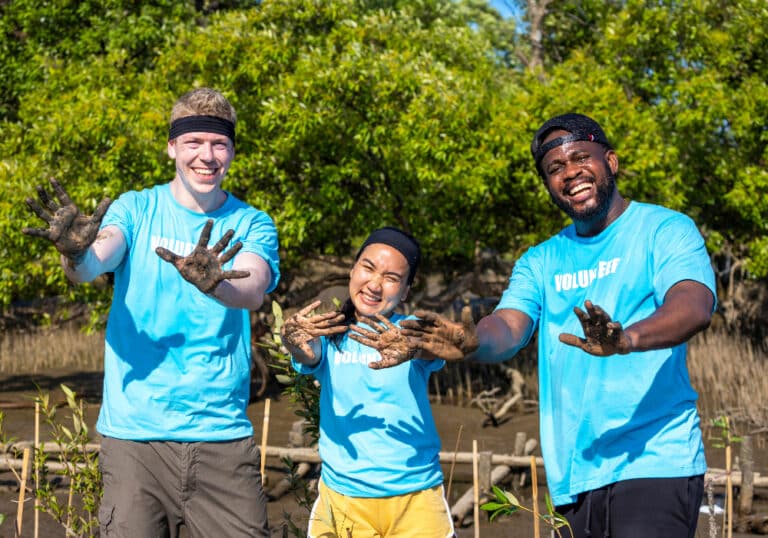
#11 VOLUNTOURISM CAN LEAD TO CHILD ABUSE AND DEVELOPMENTAL ISSUES
Children in need arouse compassion, leading to many tourists looking to volunteer in orphanages or schools. But these children are often exploited for tourists. Over 80% of children in orphanages have a living relative. Meaning that they are not orphans! Most have been separated from their families because of poverty, disability or discrimination.
This system normalises access to vulnerable children who have little to no privacy. The constant rotation of volunteers in orphanages and schools can lead to attachment disorders among children who grow up to expect all adults to enter and leave their lives so quickly. Imagine the devastation when every adult you bond with leaves after a matter of weeks.
In worst-case scenarios, children can be exposed to abuse and sexual exploitation.
Orphanages should be a last resort option for children. Instead, efforts should be put into building families and communities. We should be supporting communities to care for their own children rather than giving them over to be cared for elsewhere.
If you really want to work with children, think about what you can contribute. Are you a qualified teacher, social worker or nurse? Make sure your organisation has a sound child protection policy and commit to staying for at least two months to minimise the feelings of abandonment these children face.
#12 VOLUNTOURISM CAN DISRUPT SCHOOL EDUCATION
Many voluntourism programs lack continuity and follow-up. Once the volunteers leave, there may be no sustained support or oversight, leaving incomplete projects and unfulfilled promises.
This is especially a problem for volunteers teaching in schools. Students worldwide are learning English to give them better opportunities in the future. But how beneficial are unqualified and unskilled teachers in improving standards of education?
A constant rotation of volunteers can also disrupt their education. There’s often little to no communication between volunteers about what the children already know. This leads to them having huge gaps in their knowledge. It’s not fair on them.
#13 VOLUNTOURISM REINFORCES THE ‘WHITE SAVIOUR COMPLEX’
When not done correctly, voluntourism can perpetuate patronising and unhelpful ideas. It can contribute to the stereotype that ‘developing’ countries and communities are waiting for westerners to come and fix their problems.
Voluntourism can come across as another form of colonialism or a very patronising form of help, sending a message of ‘we are more capable than you’. It can also lead to division, and an ‘us’ and ‘them’ mentality from volunteers.
Travellers from developed countries see ‘problems’ to which they think they are the ‘solution’. They sign up to volunteer and then post about their trip on social media, usually without having stayed for long enough to understand the culture they have visited.
Think back to the last time you scrolled on Instagram. It’s far too common to see white, western volunteers posting photos of how they’re ‘helping’ in a school in Africa or ‘building houses’ for villages in South America. This further enforces the ‘white saviour complex’ for those back home. It perpetuates the ideology that people in these ‘less developed’ destinations are incapable and unskilled and that we, in the western world, need to help them.
SO, WHAT CAN YOU DO TO BE A BETTER VOLUNTEER?
It’s crucial to note that while voluntourism can have negative consequences, not all volunteer programs fall into this category. Ethical and well-planned volunteer initiatives that prioritise community needs and sustainability do exist, and they do contribute positively to development!
The key is to approach volunteering with a deep understanding of the local context, a focus on long-term impact, and a commitment to empowering communities rather than imposing external solutions.
Have you volunteered abroad? We’d love to hear about your experiences, the good, the bad, and the ugly! Shoot us a message on instagram, or pop a comment below.
LIKE IT? PIN IT!
DON’T LOSE THIS POST! SAVE IT TO YOUR PINTEREST FOR LATER
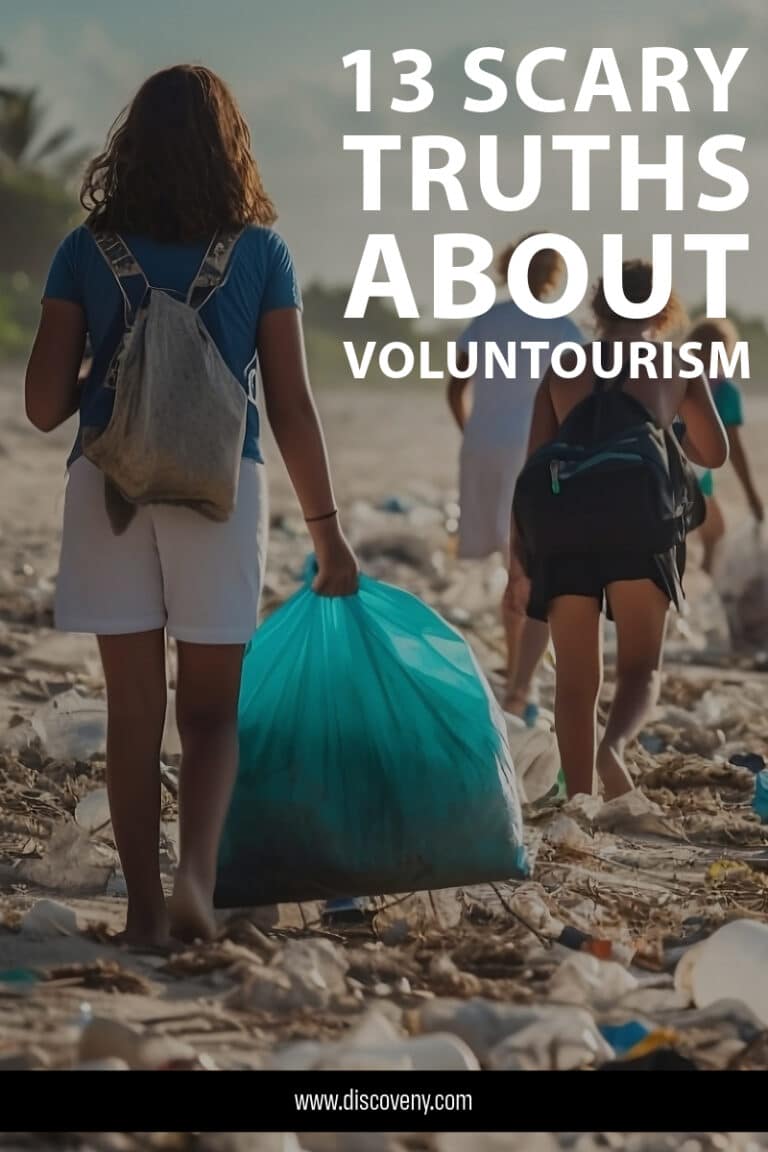
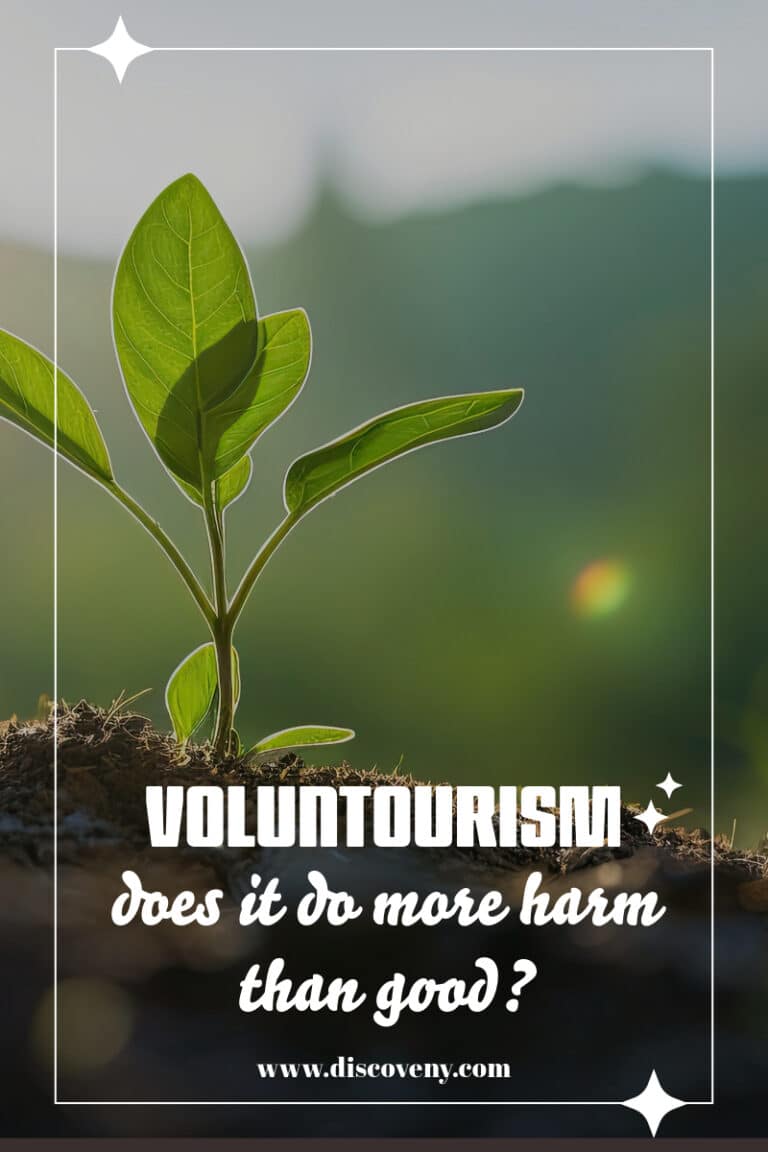
Follow our daily adventures on Facebook and Instagram
Disclaimer: The information and advice provided in this blog are the author’s opinions and based on their personal experiences. All information was accurate at the time of writing. However, things can change quickly, so always double-check current conditions and guidelines before setting out. Remember, your travels and safety are your own responsibility, and this blog can not be held responsible for anything that might happen on your adventures! Always exercise caution and good judgment. Oh, and don’t forget to get travel insurance! Happy travels!
This post may contain affiliate links (yay for transparency!) This means that I will earn a small commission, at no additional cost to you, if you click the link and choose to buy the product. I only link to stuff I have personally bought and found useful and never endorse crap. Your support helps keep the site going, thank you!
Alice
Alice is a UK travel blogger who advocates sustainable travel and being more eco-conscious on a budget. She loves coffee, her houseplants and summiting mountains.
You May Also Like

Water-to-Go Travel Filter Bottle Review
November 24, 2020
Six sustainable Christmas market tips for your December trip
December 5, 2020